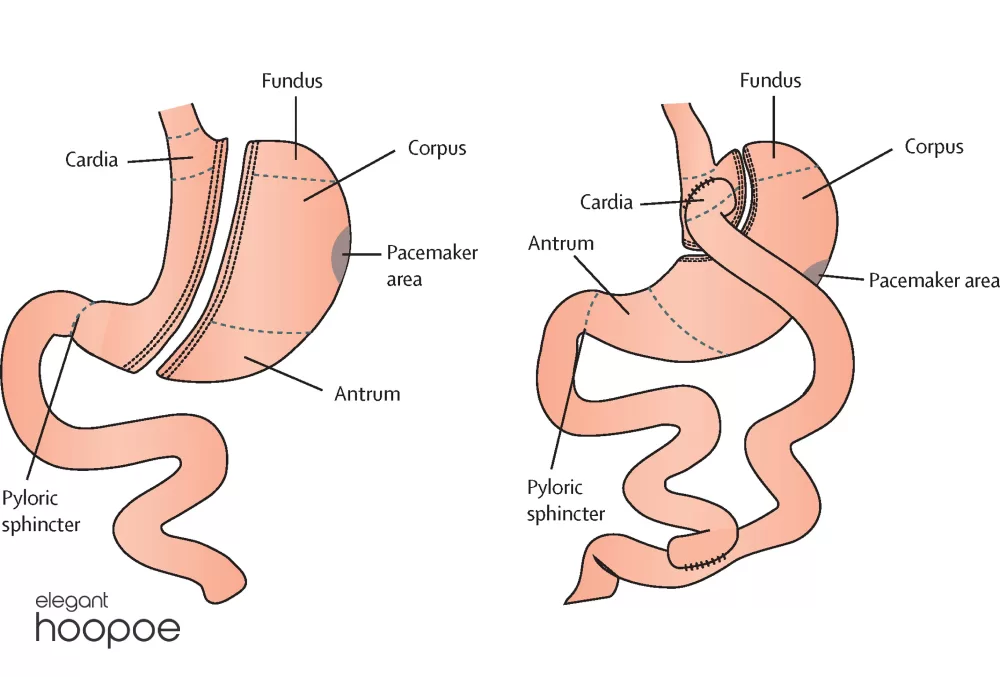The first thing that comes to mind when dealing with excessive weight is exercise though there are some cases of extreme obesity that simply makes it hard to even move rather than working out. Weight loss surgery or bariatric surgery is often recommended to those who are overweight beyond the normal range and are facing critical health issues or even fatal problems such as heart failure. In the following sections, we are going to explore all about Surgical Weight Loss, what are the most common options and who is qualified to undergo them?
Types of Weight Loss Surgery
Bariatric surgery can be performed in different ways. It might be an open surgical operation that includes cutting the abdomen or through Laparoscopy. Now with the laparoscopy method, surgical tools are inserted into the abdomen through small incisions making it the better option in most cases due to much less extensive cuts and the lower tissue damage ultimately, resulting in a much safer procedure.

There are four types of weight loss operations
- Adjustable gastric banding (AGB)
- Roux-en-Y gastric bypass (RYGB)
- Biliopancreatic diversion with a duodenal switch (BPD-DS)
- Vertical sleeve gastrectomy (VSG)
What is the best weight loss surgery?
Each one of the surgeries mentioned earlier has its pros and cons and there are other factors influential on the matter such as BMI, eating habits, and health problems. Even previous stomach procedures are considered when deciding what type of surgical weight loss is best for a patient.
However, it has been clear that people lose weight faster after a gastric bypass or sleeve gastrectomy than after other types of operations. However, the ultimate decision is made by the doctor.
Roux-en-Y (roo-en-wy) gastric bypass
Roux-en-y is probably the most common method of gastric bypass. It’s an irreversible surgery that reduces the amount of food you eat in one meal. It also decreases fat and calorie absorption.

In this method, the patient’s stomach gets cut across the top making it sealed from the rest of the digestive system. The pouch is nearly as small as a walnut and is able to hold one ounce of food. The second phase is to cut the small intestine and stick it directly to the small pouch. Therefore the food bypasses most of the stomach and gets digested much less.
Read more : What are the best ways to lose belly fat?
Sleeve gastrectomy
In this procedure nearly 80 percent of the stomach is detached. The result is a tube-like pouch incapable of digestion as before. This method also reduces the patient’s appetite and requires a shorter hospital stay.
Biliopancreatic diversion with duodenal switch (BPD/DS)
This surgical weight loss procedure is done in two steps the first one is sleeve gastrectomy. The second phase begins with closing the midsection of the intestine and connecting the first and last part of the small intestine; this step is called duodenum. The detached will be attached to the ending of the intestine making a way for pancreatic and bile juices to flow in the intestine also known as Biliopancreatic diversion. Although this procedure could result in weight loss there are risks to consider for example in most patients, vitamin deficiencies and malnutrition have been reported.
Adjustable gastric band
Another surgical method for weight loss is an adjustable gastric band in which a ring with an inner inflatable band is positioned on the top of the stomach creating a small pouch. This procedure much like gastric bypass and sleeve will create a sense of satiety after a small meal. Resulting in much less calorie and fat absorption. the inner band is combined with a balloon-shaped part filled with saline solution.

The doctor can modify and control the band to change the opening size from the pouch to the rest of the digestive system. This method is not usually recommended because of the insignificant weight loss and lots of complications it has.
Who should undergo surgical weight loss?
Surgical weight loss is offered when a patient is facing life-threatening problems such as:
- Breast cancer, prostate cancer, and endometrial cancer
- Heart disease and stroke
- High blood pressure
- High cholesterol levels
- Non-alcoholic Fatty liver or Nonalcoholic steatohepatitis
- Sleep apnea
- Type 2 diabetes
Note that bariatric surgery is only performed after the non-surgical weight loss procedures have failed.
Do I qualify for weight loss surgery?
In most clinics you will need to have certain conditions to be eligible for the weight loss surgery:
- your BMI index needs to be higher than 40 kg/m2 or a BMI of 35 kg/m2 alongside serious health problems
- Health issues associated with obesity, for instance, type 2 diabetes, arthritis, heart disease, and severe obstructive sleep apnea.
- The FDA will also allow adjustable gastric band for people with a BMI of 30kg/m2 or more with at least one of the problems mentioned.
Surgical weight loss pros and cons
Benefits of bariatric surgery include:
- Comparing individuals with similar health conditions and BMI those who underwent the surgical weight loss operations have proven to live longer.
- Bariatric surgery will significantly reduce the risk of cardiovascular diseases, type 2 diabetes, and blood pressure.
- It is also reported that patients who have done bariatric weight loss procedures have experienced less apnea and joint-related issues.
- Improved general quality of life post-surgery
Well, given the benefits of surgical weight loss one might think that most people facing obesity will without a question undergo the procedure. However, that is not the case. There are also complications associated with bariatric surgery.
Risks and side effects of weight loss surgery:
Only a few doctors are qualified to perform this complex type of surgery.
There are also conditions that make a lot of patients not eligible for the weight loss procedure for instance: those with binge eating disorder are more likely to continue this disorder after the surgery.
Also, poor psychological conditions such as depression might result in a poor outcome.
In addition, much like any type of surgery, a weight loss procedure comes with its own health risk.
Medical associated risks:
blood clots, liver disease, heart disease, and kidney stones can get worse after surgery.
A patient may also face:
- Increased risk of alcohol and drug abuse
- Hair loss
- Social life change
- Sagging skin
- Gallstones
- Postoperative infection
- nausea and dizziness
- Low blood sugar
- Malnutrition
What to expect before and after weight loss surgery
Before the bariatric surgery, you can expect the following:
- Nutrition guidelines. An expert team of dietitians will provide a full plan accordingly. This guideline usually includes vitamins, weight loss supplements, and foods you should be eating before and after the operation.
- Exercise plan arranged uniquely for you and your body condition.
- It might be suggested you lose some weight with a diet before the surgery.
- Psychotherapy. It might be necessary to take part in sessions with a therapist to take care of mental disorders such as depression and binge eating.
- Smoking. You will be asked to quit smoking.
After the weight loss surgery, you must not eat anything for 2 days or more so your stomach can heal properly, after that only liquids are allowed in your diet for a week. It is possible you will face many restrictions on your diet for the long term. To ensure the success of the surgery you will need overall health tests every month so your doctor will be aware of your condition.
How much weight I lose with the surgery
This question does not have an exact answer because the result of every method is entirely related to the individuals who undergo it. But according to previous data you can expect to lose between 35 to 80 pounds.
Is surgical weight loss safe?
We have already covered the pros and cons of losing weight surgery. Bariatric surgery like any other type of medical procedure comes with risks from blood loss to infections. However, if you are under the supervision of a highly experienced team you should be fine and not experience any discomfort during or after the operation.
Does weight come back after surgery?
After the surgery, you will have to stick to a detailed diet plan and a full workout program if you are willing to get in shape even better and keep your body that way. However, you might gain back what you lost especially if you do not control your calorie intake. Make sure you use the least amount of sugar and processed food possible.
Difference between surgery and nonsurgical weight loss
It is quite obvious that non-surgical and surgical weight loss are two separate ways. Many weight management specialists will suggest most people try out nonsurgical methods and only after that they will recommend surgery and one may not even be qualified for the surgeries possible due to factors we already have mentioned before.
The most important differences between these two are :
- Weight loss surgery result is achieved faster
- The surgical method is going to cost more
- Non-surgical ways happen to have more benefits for both mental and physical health.
- Weight loss without surgery can be achieved faster now using advanced machinery in a clinic.
- Non-surgical weight loss does not carry any risks.
- You will need to rest your body after the surgery and you may have more restrictions.
- Having those surgeries means that you change certain parts of your body and those changes are irreversible.
- For those who face critical health issues losing weight surgery and fat reduction is the best option
Surgical Weight Loss Price
So how much does weight loss surgery cost?
Generally, this type of surgery is expensive and can range anywhere from 10k to 25k USD. your insurance may cover that cost if your operation is categorized as a medical one not cosmetic. The total price depends on some factors including:
- Whether or not you have insurance
- Insurance criteria
- Geographic region
- Type of procedure or device
- The use of anesthesia
- Device fees
- Consultations
- Follow-up care
- The general price of the gastric band is 12 to 25k USD
- Gastric sleeve from 9 to almost 30k USD
- Gastric bypass ranges between 18 to 35k USD
Weight Loss Surgery Alternatives

surgery is not the only way to lose those extra pounds, however it might be the only solution for some people with severe obesity that are facing critical health situation. The first alternative that comes to mind, is exercise and diet and although most people can follow these methods, there are still some with BMI higher than 30 that might find working out too hard due to their body condition.
Another method to lose weight without undergoing surgery is to use fat removal devices and treatments. There are less invasive and non-invasive fat removal machines that utilize different technology to destroy fat cells and they have been approved by the FDA. Almost every body is eligible to try out these type of slimming devices, however it is not recommended for people with BMI higher than 30 and those with certain medical situations like pregnancy.
Weight loss supplements and medications are another alternative for surgery and there are lots of medicines in the market that claim to be effective for weight loss. You have to consult with your doctor before start taking them.







